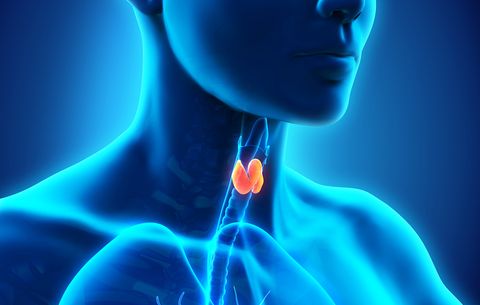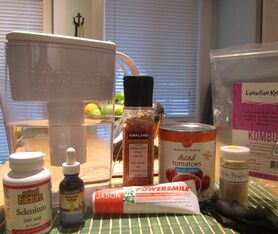|
I remember when I got my bloodwork back and my thyroid was working perfectly. My doctor had been threatening to put me on hypothyroid medication for about a year. My bloodwork had been on the cusp of serious hypothyroidism for some time. I told my doctor that I wanted to try a holistic approach to support my thyroid before starting medication. Here are the signs and symptoms of hypothyroidism that I experienced. You might be hypothyroid if....
What I Did To Support My Thyroid: 1. Drink filtered water - Although our water is awesome and touted as being the best in the world, city water contains chlorine. Chlorine prevents the uptake of iodine which is critical to thyroid health. So, if you are hypothyroid, don't drink it. Try not to swim in chlorinated pools and if you can afford it get a water filter for your shower. Better still, swim in the ocean or sea water pools. Brita water filters are far from the best on the market but are the cheapest. This system uses granulated carbon so change your filters often to prevent bacteria from growing in the filter. Aquasmart systems use a water filter that hooks up to your faucet and you can also get ones that attach to your shower. Santevia water cooler and filtration systems make the most delicious mineral rich water. 2. Use Fluoride-Free Toothpaste - Fluoride also blocks the uptake of iodine in the body. JASON Powersmile is one of the many fluoride free toothpastes that you can buy at any supermarket or health food store. This company is located in Toronto, Canada. The price is comparable to other brands and tastes great. When you go to your dental hygienist, don't get a fluoride treatment and opt for the free toothbrush over any toothpaste or mouthwash containing fluoride. 3. Buy salt-free canned goods and if you must use salt add your own sea salt instead of cheap table salt. This way you are boosting your minerals naturally. But remember salt consumption of any kind discourages weight loss and increases appetite. 4. Add sea weed and sea vegetables to your meals often. Here is my low sodium soup stock that uses both seaweed and kelp powder. RECIPES - Karen Warwick RHN So, the two pots of soup I make with this broth have sufficient iodine and minerals. It's delicious and your thyroid will thank you. A few dashes of kelp powder to any soup or salad dressing adds some depth of flavour and nutrition. Sushi, which is wrapped in nori seaweed, is a good source of iodine. 5. Supplement with iodine if necessary. But clear it with your doctor first. I added four drops of iodine to a tablespoon of purified water and took it in the morning with my selenium (see below). Iodine is found most commonly, and in the highest concentration, in the ocean. So sea vegetables are the best natural source. Iodine is critical in the production of the thyroid hormone T4. 6. Supplement with selenium. Concentrations of selenium are higher in the thyroid gland than almost any other tissues in the body and are important to activate the thyroid hormones in conjunction with iodine. If you are deficient in selenium and iodine, supplement them together, Iodine supplementation is required in conjunction with selenium supplementation in order to prevent thyroid damage from iodine supplementation alone. Good levels of selenium are needed to convert the hormone T4 to T3, the more active form of the hormone. Compliant food sources of selenium are: chia seeds (use 1 Tbs. to thicken dressings), garlic, barley, rice, seaweed, asparagus, chickpeas, quinoa and lentils. 7. Avoid raw goitrogenic foods - Soy and raw goitrogenic vegetables block the absorption and utilization of iodine. The goitrogenic vegetables are broccoli, Brussels sprouts, cabbage and cauliflower. If these vegetables are cooked in any way they are fine to eat. Soy in all forms are goitrogenic but the jury is still out in regards to fermented soy such as miso. It is advisable to avoid all forms of soy for hypothyroidism. That's just as well. Soy beans are high in fat and processed soy is not compliant in this program. 8. Consume organic foods as much as possible. - Some pesticides can interfere with iodine uptake by the thyroid. This means the ability of the thyroid to use the iodine is blocked by the pesticides. Shop with a list of the 'dirty dozen'. These fruits and vegetables should always be purchased organic unless the price is so high that you avoid buying and eating them all together. In that case make sure you wash your non-organic vegetables thoroughly and cut off and discard parts of the vegetable where you think pesticide water would gather. (like the tops of peppers) 9. Maintain daily exercise like walking - Exercise increases thyroid hormone levels and energy levels and therefore is essential for hypothyroidism.
|
Karen WarwickI am not a doctor but I am a RHN. Here is what I would do, if I were you. Archives
May 2022
Categories |


 RSS Feed
RSS Feed